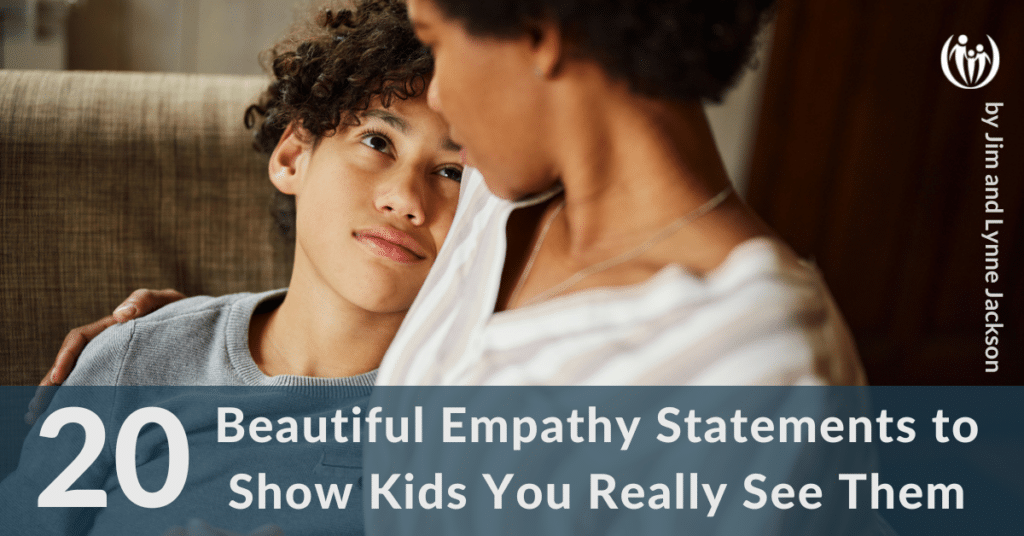
20 Beautiful Empathy Statements to Show Kids You Really See Them

In stressful interactions, do you ever think of what you wish you’d said to your kids about five minutes too late? If you’ve got a child unraveling before your eyes, it’s tempting to try to quickly “fix it” instead of understanding and empathizing.
When your child is upset, and you’re also upset, it’s hard to step into your child’s shoes. If your brain is in a fight/flight state, it prioritizes quick defensive reactions and shuts down access to your right frontal lobe area, which is a primary source of empathy. It can be wise to simply say nothing and do some deep breathing and prayer until you know your brain is calmed down from fight/flight.
When it’s time to calmly respond, do you wish you just had a go-to list of empathy statements in your back pocket to help you not trigger your child to shut down or react back?
It can be a good idea to memorize a few empathy statements that can guide you in listening to and valuing your child’s perspective. Empathy builds bridges of influence in your child’s heart, especially when they misbehave.
Want to learn more?
Check out Episode 193 of the Connected Families podcast, “Agape Love: The Surprising Time Your Child Needs It Most” for practical applications showing how to show empathy in the messes of daily life.
But first… what is empathy?
According to Dr. Brené Brown, “Empathy is feeling WITH people.”
Take a look at Dr. Brown’s short video on the difference between empathy and sympathy. As you watch, consider the application for you and your children.
Sympathy often means looking down at a person’s pain and feeling bad for them, whereas empathy is getting on the same level and problem-solving together. Dr. Brown’s closing statement, “The truth is, rarely can a response make something better. What makes something better is connection.” is so powerful.
True empathy starts with questions
Connection is not a quick sentence. It starts with thoughtful consideration of the questions,
- “What is it like to be my child right now?”
- “When have I experienced something similar, and how did that feel?”
These questions will help you experience true empathy that builds intimacy (“I get it! Me too!”) and trust with your child.
One day, our oldest son was upset about something not being fair and started into a strong rant about it, standing at the bottom of the stairs. I (Lynne) sat down on the top step to listen, but I was not initially filled with empathy. My head was swirling: “Is this disrespect or not? Should I say something about that? But he’s just really frustrated. I get that. Wow, that is really a bummer what he’s feeling now…”
The funny thing was, I could think of absolutely nothing to say. It’s a vivid memory because it felt like my mouth was simply zipped shut (unusual for me!), and I never uttered a word. I just listened and began to truly empathize with how frustrated he was. And my face showed it.
Our son finished his rant. We looked at each other sadly. He seemed to feel understood without needing things to change and left to go figure it out on his own.
Don’t underestimate the power of compassionate presence! What your face “says” will be far more important than what your mouth says.
Insincere “empathy” erodes trust
Remember the difference between empathy and sympathy? Your kids don’t want your sympathy. Remember the guy in Dr. Brown’s video who looked down from above?
An insincere expression of “empathy” can make things worse if your child perceives from your expression, tone of voice, and body language that your words are mainly aimed at getting them to calm down for your convenience. This is manipulation, and it erodes trust.
All the “empathy statements” below could be expressed in a variety of ways:
- You could say them condescendingly with sympathy, with a message of, “YOU feel this way. I can see that. But I would never feel that way.”
- You could make statements in a manipulative way, with a goal to “soothe” and end the difficult feeling, with a message of, “I don’t actually care what you are feeling, I just want you to settle down so I can have a more peaceful day.”
- Or, you could express true empathy and understanding. This is when you climb down into the dark hole with a message, “This is hard, but you’re not alone in it. I get it. I’ve been here before, too.”
Jesus empathizes with you when empathy is hard
It can be really tough to empathize with a child’s big feelings when you’re thinking, “Seriously, kiddo, this is ridiculous! Get a grip!”
We love because God first loves us, and Jesus laid down his life to join us in our struggle, including hard parenting moments. You can come boldly before His throne, confident of His empathy and help for you when empathy for your child is hard! “For we do not have a high priest who is unable to empathize with our weaknesses, but we have one who has been tempted in every way, just as we are—yet he did not sin. Let us then approach God’s throne of grace with confidence so that we may receive mercy and find grace to help us in our time of need.” (Hebrews. 4:15-16).
So, through the come-alongside help of the Holy Spirit, join your children with empathy when they struggle, even if you say nothing!
And after your children have felt truly understood they just might be calm enough to listen to your perspective — or maybe they will figure out a solution on their own! In any case, you will have modeled the loving empathy of Jesus for your child.
FREE 20 Empathy Statements
Want a quick reminder during the messes of daily life? This FREE downloadable PDF can be printed and put anywhere for some quick encouragement and ideas for what to say in those challenging moments.
What might it look like to express heartfelt empathy to a struggling child?
A Connected Families Certified Parent Coach shared this story:
“On our family vacation, my son had a very tough time with rigidity when he got an idea he was excited about. He came into a store where I was with my daughter, and he locked on to an appealing object: ‘You must buy me this thing…!’ (followed by, in his mind, some powerful-sounding threats.) I stayed light-hearted and offered to take a picture of it so we’d remember, but when we left the store, he was still fuming.
I listened calmly to his bluster for a bit and then said, ‘It’s so hard when you get excited about something in a store! I was getting excited about things in that store, too. I saw a shirt that I liked, and a bag I really liked. Wouldn’t it be fun if we could just buy all the stuff?!’
Him: ‘Yeah!!!’
Me: ‘But then I was thinking, if we spent all our money on the things we got excited about in the store, then we wouldn’t have money to spend on the things we planned on, like ice cream or paddleboarding.’ (As I stepped into his experience, he calmed down much more quickly than usual.)
Him: ‘Hmmm, I think you’re right.’
Me: ‘I’m so glad we could figure that out together.’
(And the shirt I liked said, ‘Empathy First.’ Haha. A good reminder to guide the conversation.)”
20 empathy statements to help your child feel understood:
Questions to prepare:
- “What is it like to be my child right now? What is overwhelming them?”
- “When have I experienced something similar, and how did that feel?”
- “What does the Lord’s empathy for me look like right now?”
- “What does my child need now to feel joined and understood?”
Empathy statements:
- “I can see that you’re hurting. That’s an awful feeling.“
- “Thank you for sharing that with me. I feel your sadness.“
- “I know you’re really angry with me—I’m so glad you’re honest with me.“
- “I’ve felt that way too, especially when __.”
- “Can I rub your back or just sit with you while you sort out these big feelings?“
- “You’re having a really tough day. I get it. Life is not cooperating!“
- That was hard! What else do you want me to know about it?“
- “I know you’re upset it didn’t work out. You did your best, and it’s disappointing.
- “That makes sense. I think I’d feel that way too.“
- “It sounds like you’ve had quite a day! Whew!“
- “I’d be disappointed too. You were so excited for this.“
- “Friendships can be so hard! I remember struggling with these problems at school too.“
- “You know, I do the same thing sometimes! It can be really hard to make the right choice.“
- “I think I hurt your feelings. Can we talk about it?“
- “It must be tempting to give up…“
- “We’re both struggling right now, aren’t we?“
- “Do you want to hear about my worst day at school, too?“
- “This is hard to talk about, isn’t it? That’s ok.“
- “I don’t know what you should do, but I’m always in your corner.“
- “It’s brave of you to talk honestly with me.“
Any of these statements can then be followed up by quiet listening and giving your child space to sort out their thoughts and feelings or the simple invitation, “Want a hug?”
Stop, Look, and Listen. When you stop what you’re doing, look at and listen to your child, they learn about a God who really hears. Savor that truth every time you do it!
“Let the wise listen and add to their learning, and let the discerning get guidance.” Proverbs 1:5
© 2024, 2015 Connected Families
Ready to dive in and learn more about the Framework?
Our 8-session online course, Discipline That Connects With Your Child’s Heart will guide you through each level of the Framework. If you’re looking for a grace-filled way to parent, this course is for you!





